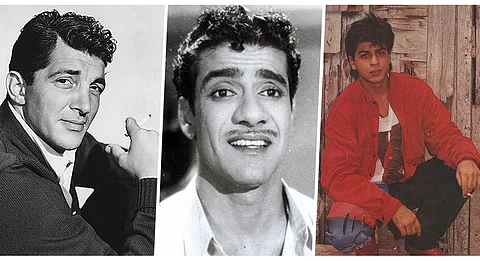
- In-Depth Stories
- Web Stories
- Reviews
- News
- FC Lists
- Interviews
- Features
- FC SpecialsFC Specials

For this week's episode of Carbon Copy, let us start with Baazigar! The most popular song from the film's soundtrack was perhaps 'Yeh Kaali Kaali Aankhen'. Anu Malik was going through the best phase of his career, with films like Sir, Phir Teri Kahani Yaad Aayee and Jaanam. And Kumar Sanu won his 4th consecutive Filmfare Award for Best Male Playback Singer for the song.
Intriguingly, the song is an inspiration from 2 completely different sources!
Now, considering most of us would intricately know the song from Baazigar, listen to how the 1986 song 'Because Of You' (by the 80s girl-group Cover Girls) opens. When I say opens, I mean the full first 40 seconds.
You'd swear that you are in fact listening to the song from Baazigar.
Now, move on to 2:30 in the song and you will hear the distinctive background music that was used in the Hindi song immediately after the opening chorus.
So, Cover Girls' 'Because Of You' is the first source. But this week's update is more about the second source.
The actual song, which goes 'Yeh Kaali Kaali Aankhen' seems to owe some of its roots to a very old Neopolitan song named 'Guaglione', composed in 1956 by Giuseppe Fanciulli and written by Nicola Salerno. Fanciulli had composed it as an entry to the Festival di Napoli, a Neapolitan song contest. It was sung by 2 singers, Grazia Gresi and Aurelio Fierro, for the contest. Guaglione won the contest that year and went on to become very popular. Here are the 2 versions – what would be of your specific interest will be starting 0:40 in the version by Grazia Gresi, and starting 0:35 in the version by Aurelio Fierro.
The most popular version of 'Guaglione' was by Perez Prado, who converted it into a Mambo dance track!
The Walt Disney Music Company bought the U.S. publishing rights for the song and it spawned several new versions, with new, English lyrics. The English version of the song, with lyrics written by Alan Bergman and Marilyn Bergman was 'The Man Who Plays the Mandolino', made popular by many singers, including Dean Martin.
If you notice, the English version starts at the point that I have highlighted in the 2 original Italian versions! And that's the starting point of the Baazigar song as well! The original Italian song is very popular and has even been featured in an Irish advertisement by Guinness stout, in 1994.
In contrast, the Indian versions, considering how they open, most probably sought inspiration from the English version.
But Anu Malik is hardly the first composer to seek inspiration from 'The Man Who Plays the Mandolino'. That credit should be shared between composers Snehal Bhatkar and the Tamil composing duo Viswanathan-Ramamurthy.
Snehal Bhatkar used 'The Man Who Plays The Mandolino' almost as-is, including the prominent mandolin piece for his song 'Lehron Pe Lehar' in the 1960 film Chhabili. It was sung by Hemant Kumar and Nutan (who also starred in the film, alongside Kaysi Mehra).
The other version of the song is much like Anu Malik's re-imagination – not using the tune as-is, but skillfully modifying it while also retaining the essence. That was an iconic Tamil song from the 1960 film Kavalai Illaadha Manithan. The song was 'Pirakkum Podhum Azhugindraai', sung by Chandrababu with music by Viswanathan–Ramamoorthy and memorably philosophical lyrics by Kannadasan. The prominent mandolin background at the end of the first line (in 'With his little mandolino…' and 'Lehron Pe Lehar'; replaced by a vocal chorus in 'Yeh Kaali Kaali Aankhen') in Tamil, 'Pirakkum Podhum Azhugindraai', is replaced with a violin background.